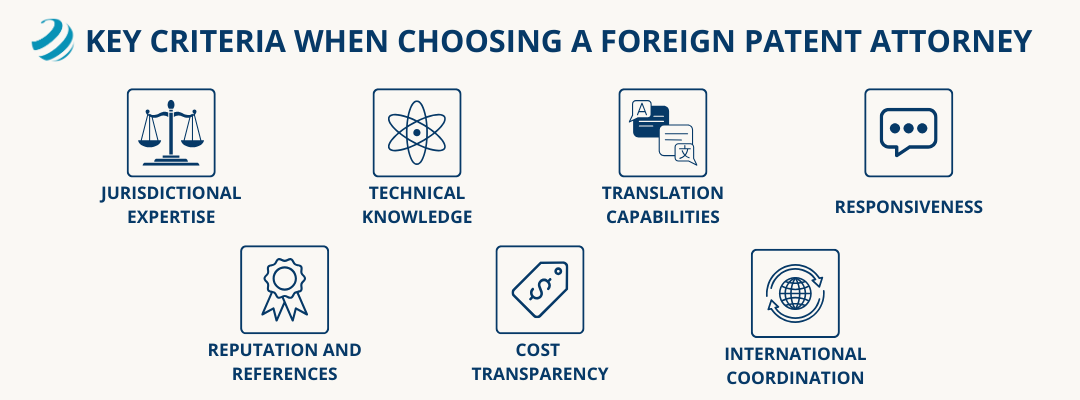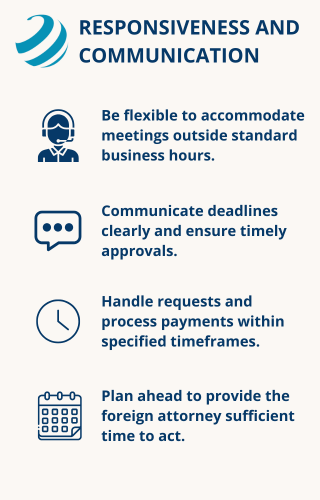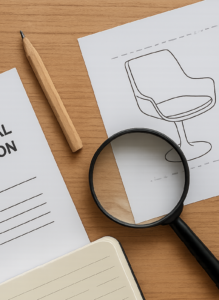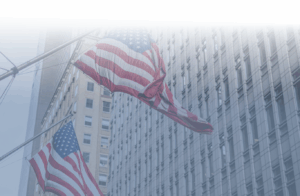How to Choose a Patent Attorney Abroad for International Patent Application
Key Criteria for Making the Right Choice
Expanding your patent protection beyond your home country is a strategic step—whether you’re safeguarding a key invention or seeking broader commercial opportunities. But navigating foreign patent systems requires local expertise. That’s where foreign patent attorneys come in. Choosing the right one can be the difference between a smooth filing process and costly delays or rejections.
Here are the key factors to consider when selecting a foreign patent attorney:

Jurisdictional Expertise
Each country’s patent laws and procedures are different. Filing in a foreign jurisdiction without local knowledge can lead to unnecessary delays, rejections, and increased costs. That’s why it’s crucial to work with a patent attorney who:
- Is registered before the local patent office
- Has experience handling national filings and international procedures (e.g., Paris Convention, PCT)
- Understands local examination practices and potential pitfalls.
We’ve seen cases where clients rely on their local attorney to file directly with a foreign patent office without sufficient expertise. This often leads to avoidable Office Actions and higher costs to correct the issues later. If your local counsel intends to manage the foreign filing, it’s important to confirm whether they’ve done it successfully in the past, which patents they’ve handled, and whether those applications were granted. If not, it’s worth asking why.
Another common issue arises when patent specifications are drafted according to the rules of the applicant’s home country such as Brazil and submitted without proper adaptation. For example, a format accepted in Brazil might not comply with the strict requirements of the United States Patent and Trademark Office (USPTO).
A typical case involves a mechanical invention from Latin America, where claims often include expressions like “characterized by,” which are acceptable in some jurisdictions. However, in the U.S., such expressions may trigger objections related to indefiniteness or functional claiming.
Technical Knowledge
A strong patent attorney doesn’t just understand the law—they also need to understand your invention. Look for someone with experience working on patents in your specific technology area.
An attorney who has prosecuted similar inventions will:
- Ask better, more relevant questions during the drafting process
- Understand the inventor’s feedback more quickly and accurately
- Anticipate potential objections based on patterns seen in similar cases
This level of familiarity can significantly reduce the time spent on back-and-forth communication and legal revisions, ultimately lowering your legal costs.
It’s also important to remember: the inventor is always the expert in the invention. The attorney’s role is to translate that knowledge into a legally robust, technically precise application, and to advise the client based on local procedures and practical experience. A good attorney will listen carefully, identify the invention’s unique aspects, and structure the claims to protect its commercial value in the most effective way possible.
Translation Capabilities
Language can be one of the most underestimated risks in foreign patent filings. A poorly translated specification can create confusion, weaken your claims, or even lead to a premature rejection. That’s why it’s essential to work with an attorney who:
- Is fluent in the working language of the local patent office
- Has experience working with foreign clients and is culturally sensitive, particularly important in regions like the Middle East, Latin America, or parts of Asia
- Is flexible if the applicant prefers to provide the translation, but also prepared to identify and correct any potential issues
- Can provide or coordinate accurate technical translations when needed
- Understands how terminology choices affect claim scope and enforceability
At Patentarea, we understand that translation costs can be a significant part of your international filing budget. That’s why we’re flexible: many of our clients prefer to handle translations on their own to reduce expenses, and in many cases, that works fine.
However, applicants should be aware that direct or non-technical translations often lead to minor misunderstandings or worse, major misinterpretations of key concepts. These issues typically become apparent when responding to the first Office Action, which, in over 95% of cases, cites prior art to question novelty or inventive step.
In most instances, translation problems can be addressed during that first response phase. But we’ve also seen more serious cases, where the translation was so unclear or misleading that the examiner rejected the application outright without even analyzing the prior art. In such cases, the applicant must incur additional costs to correct the translation and respond to the examiner, potentially delaying the process.
Working with a local attorney who is both linguistically and technically competent can help ensure your invention is understood correctly from the start, minimizing risk, reducing costs, and improving your chances of success.
Responsiveness
When working across time zones and legal systems, responsiveness is more than a convenience, it’s essential. Delays in communication can lead to missed deadlines, rushed decisions, or even loss of rights. That’s why it’s important to choose a patent attorney who:
- Replies promptly to emails and client inquiries
- Is flexible and open to scheduling meetings outside standard business hours when time zones require it
- Clearly communicates deadlines and next steps
- Provides status updates without being prompted
However, responsiveness must go both ways. The applicant also plays a crucial role in ensuring timelines are respected. This means being prepared to review and approve drafts, such as Office Action responses within the timeframe indicated by the attorney. This allows the attorney sufficient time to incorporate feedback, make necessary adjustments, and file on time.
Similarly, when it comes to tasks like paying annuities or filing formal responses, last-minute approvals or payments can be problematic. Time zone differences mean that what seems like a “same-day” action for the client could already be past business hours or even the deadline in the local jurisdiction. In some countries, attorneys are still required to appear in person at the patent office adding an extra layer of logistical complexity.
An organized, proactive relationship with your attorney ensures smoother communication, timely filings, and better outcomes

Reputation and References
When selecting a foreign patent attorney, reputation matters. Since you may not be familiar with the local market, look for indicators that reflect consistent, high-quality service. These include:
- Years of experience in the jurisdiction
- Membership in professional associations or international IP networks
- Recognitions, awards, or frequent collaboration with trusted firms
- Positive testimonials or client feedback on results and communication
Whenever possible, ask for references from other foreign associates or clients, especially if they’ve worked in your specific field of technology or jurisdiction.
But beyond credentials, there’s something equally important: personal rapport. A short video call can go a long way in assessing whether you feel comfortable with the attorney’s communication style, understanding, and attitude. This is especially valuable when you’ll be working across language or cultural barriers.
In international patent work, trust and clarity are essential. A well-regarded attorney with whom you have good professional chemistry can make the entire process smoother and more efficient.
Cost Transparency
International patent services often involve multiple professionals, languages, and official fees, so it’s critical to understand the financial terms before committing.
One of the most common frustrations we’ve seen from clients is the appearance of unexpected charges. Some attorneys include fees for things like:
- Reporting Office Actions or forwarding official documents
- “Copying fees” or unspecified disbursements
- Minor communications billed by time, even if the action taken was minimal
To avoid surprises, always ask in advance:
- Is there a flat fee or hourly rate?
- Are reporting (e.g., Office Actions, publications) charged separately?
- Are translations, courier costs, or communications included in the initial quote?
At Patentarea, we pride ourselves on providing clear, upfront cost estimates and using flat fees for each service. Our clients know what to expect from the beginning, with no hidden charges. This transparency allows them to plan their IP strategy and budget confidently across multiple jurisdictions.
Working with a firm that values transparency not only reduces financial stress, it also builds trust and long-term efficiency.
International Coordination Support
Filing patents in multiple countries can quickly become complex, each jurisdiction has its own rules, timeframes, and examination practices. Without proper coordination, applicants may face inconsistent claim strategies, missed deadlines, or duplicated legal efforts and costs.
That’s why it’s highly beneficial to work with a patent attorney or firm that:
- Has experience managing international filings across jurisdictions
- Understands how to align claim strategies to comply with different national standards
- Maintains a network of reliable local agents or foreign associates
- Can act as a central point of communication with your main patent counsel or team
At Patentarea, we handle this coordination for our clients by working with a vetted global network of local attorneys in over 150 countries. This not only streamlines communication but also improves efficiency, reduces legal risks, and ensures a coherent international protection strategy.
In practice, effective coordination allows for smarter strategic decisions. For example:
- When managing filings in multiple jurisdictions, it’s often advisable to delay examination requests in certain countries until the patent is granted elsewhere. This can support subsequent acceleration through mechanisms like the Patent Prosecution Highway (PPH), read more about this in our PPH Guide.
- Firms with international experience can help evaluate whether it’s more cost-effective to proceed via direct national filings or through a PCT application, depending on the number of countries and the timeline.
- Coordinated teams can share cited prior art references across countries, enabling applicants to anticipate and reuse arguments or claim amendments that proved successful elsewhere.
Centralized coordination becomes especially helpful during:
- PCT national phase entries
- Responses to similar prior art objections across multiple countries
- Strategic decisions about continuation, divisional filings, or abandonment
When your IP portfolio spans borders, working with a firm that understands international alignment is a necessity.
Just as important as legal coordination is having tools to support portfolio management. At Patentarea, we offer a centralized system that allows clients to access their files, track deadlines, and manage documentation across all jurisdictions in one place. Our software simplifies communication, keeps everything organized, and ensures transparency at every stage of the process. Whether you’re managing a handful of cases or a large international portfolio, our platform helps you stay in control, without getting lost in the details.
Partnering for Success
Choosing a foreign patent attorney is not just about legal knowledge, it’s about trust, communication, strategic insight, and practical tools to support your innovation across borders. From understanding local procedures to managing translations, deadlines, and multi-country coordination, every step matters.
At Patentarea, we bring together international experience, a network of trusted local attorneys, fixed-fee pricing, and a centralized platform to simplify and streamline the entire process for you. Whether you’re filing in one country or twenty, we help you make informed decisions, avoid costly missteps, and protect your inventions globally with confidence.

Ready to expand your IP strategy internationally?
Contact us today for a free initial consultation and discover how we can support your business across borders.



